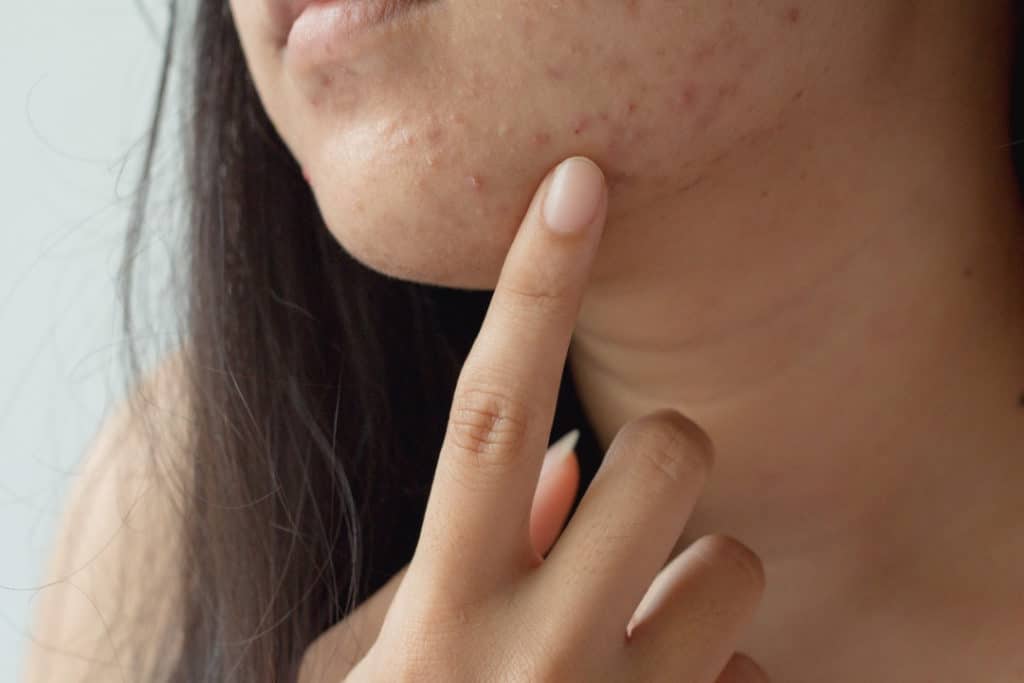Acne has a variety of causes, most commonly from hormonal changes or genetics. But did you know that eating disorders can also play a role in the development of acne? Not every person with an eating disorder has acne, and not all acne is a symptom of an eating disorder. With this said, an eating disorder can cause your body to react in ways you may not have thought of, and acne can be one of those effects.
Why Does Acne Develop?
Acne is a skin condition that develops when pores and hair follicles become clogged with dead skin cells and oil. This creates blackheads, whiteheads, and pimples. Research has shown that acne can be persistent and even scar your skin in severe cases.[1]
Acne + Anorexia Nervosa
People struggling with anorexia tend to avoid important foods and nutrients, leading to cascading effects. One of those effects is changes to the skin on your face. Your body must prioritize energy for more critical functions, and acne-free skin isn’t necessarily something that’s high up on the totem pole for your body. Additionally, research has shown that anorexia can create thyroid, renal, and hepatic functioning problems that can cause itchy skin and an increased risk of acne development.[2]
Acne + Bulimia Nervosa
Bulimia and acne are closely related conditions. Repetitive binging and purging create changes to the skin that lead to the development of acne. For one, most people with bulimia binge on foods filled with sugars and sweets, which can lead to fluctuations in hormones and sebum production. Bulimia can also cause dry skin, which can lead to acne by producing a surplus of pore-clogging dead skin cells. Additionally, people with bulimia face hormonal imbalances that can lead to acne.
Can Acne Be a Sign of an Eating Disorder?
As ongoing research on eating disorders continues, researchers have found that hyperpigmentation, acne, and facial dermatitis can help identify anorexia nervosa in an individual.[3] To be sure, the presence of acne or other skin conditions alone cannot determine that an eating disorder is present, but it is a symptom to look for among others if you suspect that you or a loved one is suffering from an eating disorder.
If you have an eating disorder, it’s important that you find the appropriate treatment processes to help in your recovery.
Acne Treatment Must Start at the Source — Don’t Let Your Eating Disorder Go Unaddressed
Where can you turn to begin your recovery process? Look no further than Toledo Center. Our treatment programs — like residential treatment or our family education and coaching program — provide programs that treat the root causes of your eating disorder. Partner with our clinical professionals for more insight into how we can help you or a loved one achieve powerful healing.
Contact us today by calling Toledo Center today or completing our contact form, and we’ll be in touch with you promptly.
Sources:
- https://www.mayoclinic.org/diseases-conditions/acne/symptoms-causes/syc-20368047#:~:text=Acne%20develops%20when%20sebum%20%E2%80%94%20an,Excess%20oil%20(sebum)%20production
- Strumia, R. (2013). Eating disorders and the skin. Clinics in Dermatology, 31:1.
- https://www.dermatologytimes.com/view/eating-disorders-can-be-diagnosed-early-recognizing-skin-signals

